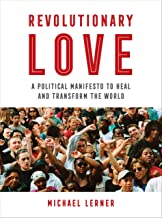Revolutionary Love: A Political Manifesto to Heal and Transform the World by Michael Lerner; (c) 2019; University of California Press
By John E. Finley

SAN DIEGO — During my childhood in the 1970s and 1980s, television was the best window to the World for me.
Through it, and often in real time, I learned about the hugely varied existences of people outside of my Los Angeles suburb. I learned of Humanity’s dreams and accomplishments, of Humanity’s mistakes and misdeeds. I learned what America believes—or should believe—and what “America” is and has been. I learned what makes a good American “good”. I learned about the depth and breadth of Madison Avenue’s marketing power. I experienced the influence of the brilliant confluence of editing, jingles, and catchphrases. My eyes were baptized in the images of beautiful people hawking happiness and my ears were Siren-songed by the locutionary genius of the politician, the pundit, the news reader. I learned what and whom I should love. I learned what and whom I should fear. I learned what and whom I should hate. I learned to strive for material wealth and to adore those born into it. I was taught to be a good consumer and to seek happiness in the never-ending acquisition of toys and bragging objects.
And among of the bevy of cop shows, kid shows, MGM musicals, PBS documentaries, sportsball spectaculars, and Special Reports from Action News, shining from that cathode ray tube, in Dick Tracy-esque hypercolor, was the holiest of holies, the most Alpha of all Omegas: Gene Roddenberry’s Star Trek.
Yeah, seriously.
Really.
Well, not seriously, seriously.
But . . . , Star Trek in all of its future iterations has shown me that we humans and we metaphorical-variations-of-humans-in-alien-form, initially struggling against each other, and then learning from each other and working together, can secure a better future for all.
The universe of Star Trek is also one of post scarcity: no one in the Federation of Planets wants for food, clothing, or shelter. Literacy is literally interstellar. In fact, it is expected that every sentient being should pursue some forms of corporal and intellectual satisfaction and self-actualization that would put a permanent grin on the face of Abraham Maslow.
The universe of Star Trek is no Utopia, no Shrangri-La. Conflict exists, as it must, when two or more people interact. Roddenberry’s sci-fi fable is built upon the ashes and rubble resulting from past mistakes and misdeeds, and of wisdoms gleaned. That salient point of past, future history is made abundantly clear, multiple times, throughout the durations of multiple series.
Reader—that’s you!—we are on the cusp of living on (or below) a planet of ashes and rubble.
Our oceans are over-fished and filled with plastics and pollutants. Coral reefs are dying. Coastal cities are destined to be inundated by brackish water, costing trillions and necessitating the mass migrations of billions of people inland. Dustbowls now exist in place of arable land, and they are spreading. Pollinating bees are dying. Species of known and unknown plants and animals are going extinct. Glaciers are melting. Rainfall is becoming sporadic. Drought and weather extremes are becoming the norm as our global climate changes as a direct result of our collective folly, greed, and inertia.
And politically, despite our collective experience, despite our formal and informal educations, we are witnessing and allowing and even encouraging the continued rise of tyrants: cartoonish tyrants, buffoonish tyrants, mustache-twirling tyrants, James Bondian tyrants, and slick & silver-tongued corporate tyrants the likes of which every person in the last 90 years with access to a television set or movie theater has seen—be it children’s animation, live-action Disney, Japanese anime, Bollywood actions flicks, Mexican comedies, Nigerian melodramas, or the silent films of Charlie Chaplin. We have seen them in all of their manifestations. These men—and they are mostly men—confidently preach division and discord and hate and greed.
Speaking of greed, if you have money—and I mean a heck of a whole lotta money—enough to keep your trust-funded grand- and great-grandchildren in upper-middle-, or even upper-class comfort, then know this: MONEY WON’T PROTECT THEM. The future rabble and peasants and barbarians at the gates of their walled and gated communities, will breach those barriers, Henry the Fifth-style, and that hungry, desperate, angry Army of the 95% will coldly or with radiant glee, enact horriblenesses upon them, your babies.
What will follow, after these uprisings occur, will mirror the outrages of the French Revolution and the atrocities of the Haitian Slave Revolt and the idiocies of post-Czarist Russia.
Yet, I hope that I am not some latter-day Cassandra, some false prophet of gloom and doom. I am hoping that barrels of our blood will not be spilled, that our Human Civilization will not burn and crumble, that 99% of non-human mammals weighing more than 90 pounds will not become extinct. I am hoping that we, Homo sapiens, can and will learn from our mistakes and misdeeds. I am hoping that we defer to the insights, foresights, suggestions, and policies of sober-minded experts and visionary humanitarians in all matters pertaining to our existence and co-existence with other life on this, our one and only Home.
Achieving such wisdom on a global scale will be difficult, but not impossible. We can.
We can.
There are voices, in the here-and-now, that are heard, but not listened to, and seemingly ignored and unheeded.
One of those voices flows from Rabbi Dr. Michael Lerner, some menschkatz and psychotherapist philosopher with licensing letters succeeding his surname.
He is an old and wise hippy who was inspired by the dreams of the 1960s and -70s, fought the good fight, survived that fight, learned from the mistakes of that era, and who, to this day, continues to learn from and educate others.
He founded and writes for Tikkun Magazine (www.tikkun.org).
He also wrote a book (his most recent) that I read and enjoyed. It’s called Revolutionary Love: A Political Manifesto to Heal and Transform the World, 2019, University of California Press.
Minor, honest, quibble: I am no fan of the title of this book. In fact, each time that I read the phrase “revolutionary love”, it compels me to roll my eyes so far back into their sockets, that I think I can almost see my pituitary gland, or “third eye”. I suspect the rabbi’s inner-hippy is somewhat deficient in expressing and promulgating his truly viable memes via brutal, cut-throat marketing (brilliantly employed by the political right) using three-, to four-word catchphrases that would fit onto a bumper sticker.
Nevertheless, the very reverend double-doctor rabbi’s observations, analyses, and solutions for tikkun olam, or repair the world, are spot-on. They are rational, they are practical, they are achievable, and above all, they are needed. Lerner’s perspective as a philosopher, psychotherapist, and rabbi allows him a melding of insight regarding human fears, needs, and desires, both spiritual and secular. Lerner cites Leviticus, chapter 19, verses 33-34, the “love your neighbor/the stranger as yourself” passage and expands its purview to include the animals and plants with which we share this planet and rely upon for our very survival. This is his revolutionary love, an expansive love that transcends tribe and gender and species. It is inclusive of Earthly life. It is “recognizing, feeling, and acting upon the truth that we are all interconnected.” . . . And here, I have another quibble to air: our interconnection is not a mere philosophical or theological “truth”; rather, our interconnection is fact, supported by modern, scientific methodologies, explorations, and findings. Fact.
Rabbi Lerner offers sane, real world solutions that include, but are not limited to the following: a truly, living-wage; a maximum wage, not to exceed ten times the median national yearly income, which necessitates the gradual elimination of multi-millionaires and billionaires, i.e., people so extremely and pathologically and obscenely obese with material wealth and power that the remaining 99% of Humanity is rendered their slavish puppets; the nationalizing of resources; the decoupling of money from politics by making all elections publicly funded; the removal of the profit motive from medical and pharmaceutical research, development, and dispensation. He also tackles the axiomatic imbalance of power between women and men, noting that “those qualities that have been stereotypically associated with women and girls are actually the best basis for building a decent, just, ethically coherent, and sustainable world.” Indeed, roughly 50% of our species is discouraged or outright barred from participating in governments at local, regional, national, and international levels, resulting in an inevitably deadly dynamic that will literally kill us and the biosphere in which we live.
This imbalanced insanity has no long-term viability. It must be changed.
Read this book and act.
*
John E. Finley is freelance writer based in San Diego.
